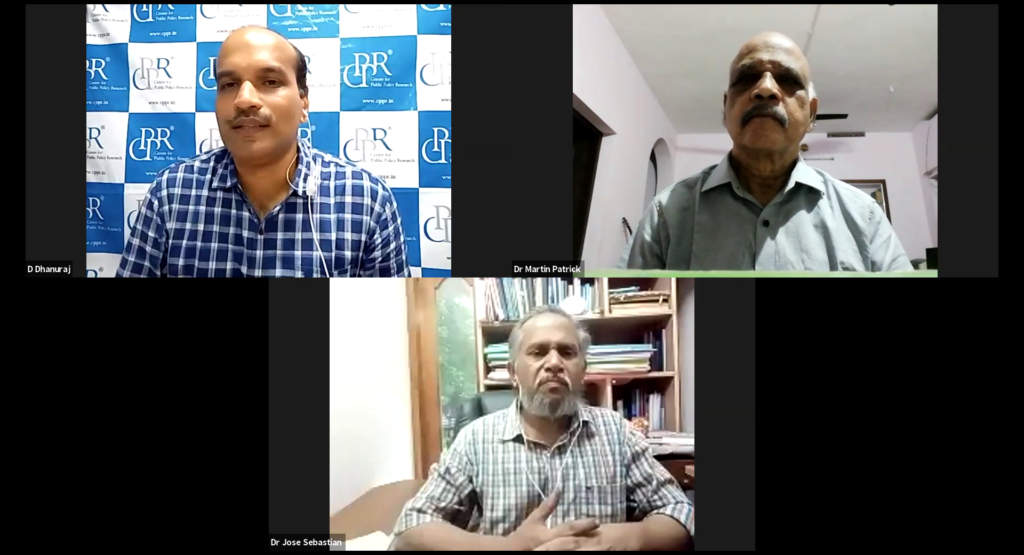Centre for Comparative Studies

Webinar held on relations between India & Sri Lanka
September 21, 2020
Middle East Peace Plan: Emerging Political Dynamics and Implications
September 22, 2020“Kerala Dhanakaryam”- Virtual Book Launch and Panel Discussion

The Centre for Public Policy Research (CPPR) conducted a virtual launch and panel discussion on the book “Kerala Dhanakaryam”, authored by Dr Jose Sebastian, Senior Fellow (Finance) at CPPR, and a former faculty of Gulati Institute of Finance and Taxation, on September 10, 2020. The speakers of the session also included Dr Martin Patrick, Chief Economist, CPPR. Dr D Dhanuraj, Chairman of CPPR, was the moderator of the session.
The premise of the book “Kerala Dhanakaryam” is the deteriorating fiscal situation of Kerala’s economy. The book intends to inform common people about the tax collection process of the State and influence decision makers to make the collection process more efficient.
Dr Jose Sebastian pointed that the State’s worsening fiscal condition is attributed to the failure in mobilising revenue resources and lack of non-planned revenue expenditure. The State revenue is mobilised largely from four sources namely, petroleum, liquor, lottery and motor vehicle taxes. Among these, lottery and liquor contribute the highest share of revenue.
In a state like Kerala, where even the lowest paid casual labour resorts to the habit of alcohol consumption, the tax burden falls on the poor as alcohol is charged 10 times the actual purchase price. Although the intent to levy high tax on liquor was to reduce consumption, the statistics show no decline in consumption. Liquor has taken the characteristic of an essential commodity in the State. Given this context, the author states that raising tax on liquor is not moral as it is the poor who get disproportionately burdened.
In the book, he also emphasises on the socio-cultural factors prevailing in Malabar and Travancore-Cochin region resulting in an unequal distribution of the tax burden. The available data shows that the lowest per capita liquor sales are observed in the districts of the Malabar region, predominantly consisting of Muslim population. The argument is based on the ground that Muslims have cultural and religious constraints in consuming alcohol and lottery practices. On the other hand, Travancore-Cochin has a higher concentration of the Christian and Hindu community.
A fiscal imbalance is clearly visible along the geographical lines due to the underlying socio-cultural factors. The author iterates that public resource mobilisation should be reworked so as to make the contributing factors more secular in nature to overcome these inequalities.
On the expenditure front, he states that 67 per cent of the State’s government expenditure is on salaries and pension. This goes to only 5 per cent of the State’s population. The gap between pensions for salaried class and the pensions for the non-salaried class is very high. This also adds to social inequality.
Another notable issue faced by the State is the difficulty in realising the GST targets as per the estimations. The major share in the State’s GDP is from the service sector, mainly comprising micro, small and medium scale enterprises, of which many got exemptions from the tax bracket with the increase in GST slab rates. This highlights the dire need of revenue sources for the State.
He concluded that without taking steps to correct the imbalance in public resource mobilisation prevailing in the State, the crisis will only compound. There is a need for a shift in the resource mobilisation strategy from liquor and lottery, which puts additional burden on the poor and marginalised group.
In order to increase the tax revenue of the State, he proposes the following corrective measures.
- The government should increase Property Tax, both commercial and residential, in a progressive manner.
- Public resources should be raised from secular sources.
- A shift from the current pension system to a social system that provides social security to every individual without discrimiantion.
As a response to the issues and corrective measures highlighted by Dr Jose Sebastian, Dr Martin Patrick mentioned that the suggestions were not addressing the fundamental issues of the Kerala economy. The lottery practices have led to generation of employment and doing away with it will only add to the unemployment woes the State is already confronted with. A holistic understanding of various sectors needs to be undertaken to understand the fiscal State of the government. Another point that was found amiss was the author’s failure to account that Kerala has been one of the states in the country disbursing maximum welfare pensions.
Dr Shaijumon from Indian Institute of Science and Technology added that the issue pertaining to the salaried class was looked at from an expenditure side in the book, rather it should be looked at from a development perspective since the administrative functions have also contributed to the well-being of the State.
The report is prepared by Goutham KA, Project Associate, CPPR.

